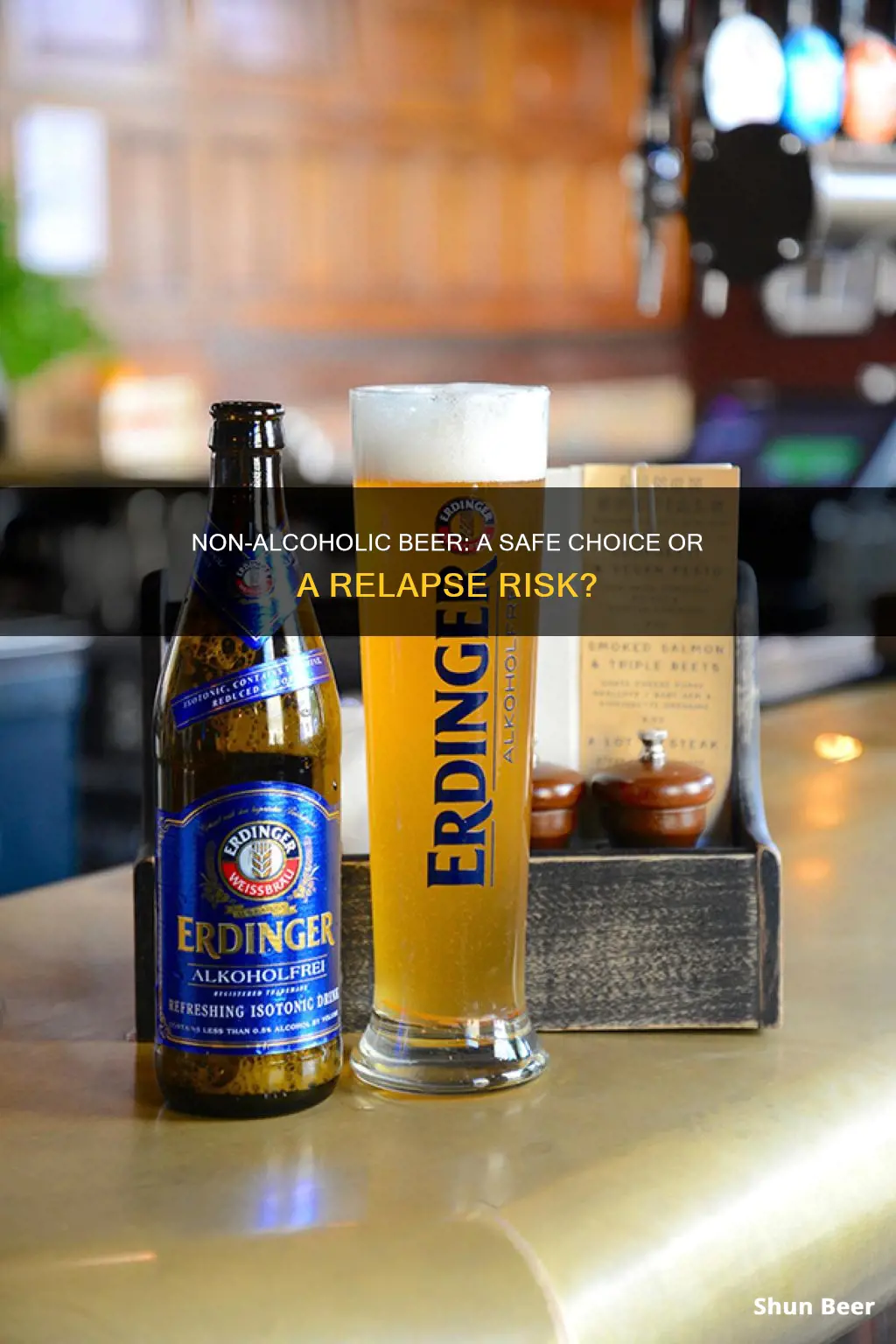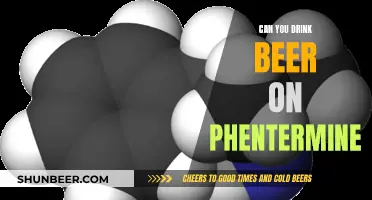
Drinking non-alcoholic beer is a controversial topic among those in recovery from alcohol addiction. While some people believe that it is a safe alternative to alcoholic beverages, others argue that it can trigger a relapse. Non-alcoholic beers typically contain up to 0.5% alcohol by volume (ABV), which is not enough to cause intoxication. However, the taste, smell, and appearance of non-alcoholic beer can be powerful triggers for those in recovery, potentially leading to cravings and a relapse. Some studies have shown that even the smell of beer can activate the reward centre in the brain, releasing dopamine. This, along with the psychological effects of drinking from a similar bottle, can be a dangerous gateway for recovering alcoholics. While individual choices and experiences vary, experts generally advise against consuming non-alcoholic beer during recovery to avoid the risk of relapse.
| Characteristics | Values |
|---|---|
| Alcohol content | Non-alcoholic beer typically contains less than 0.5% alcohol by volume (ABV). However, some products may contain higher levels of alcohol than advertised. |
| Taste | Non-alcoholic beer is designed to mimic the taste of regular beer. |
| Smell | Non-alcoholic beer smells like regular beer, and this can trigger cravings and increase the risk of relapse. |
| Social acceptance | Non-alcoholic beer allows individuals to fit in with drinkers without actually consuming alcohol. |
| Addiction | The taste and smell of non-alcoholic beer can trigger addiction-related memories and cravings, potentially leading to relapse. |
| Individual differences | Some individuals in recovery may find non-alcoholic beer helpful in social situations, while others may view it as a relapse or a trigger. |
What You'll Learn

Non-alcoholic beer still contains alcohol
Non-alcoholic beer is not always completely alcohol-free. In the United States, brewers can label beer as "non-alcoholic" even if it contains small amounts of alcohol. The threshold for non-alcoholic beer is 0.5% ABV. While this is similar to the amount of alcohol found in some fruit juices, ripe bananas, and bread, it is still incorrect to say that non-alcoholic beer is 100% alcohol-free.
The alcohol content of non-alcoholic beer can vary, and it is important to check the labels before consuming. While some products claim to contain 0.0% ABV, by law, non-alcoholic beers can contain up to 0.5% ABV. Additionally, research suggests that many non-alcoholic beers contain more alcohol than their labels indicate. A study found that out of a sample of no- or low-alcohol beers, 29% had higher alcohol levels than stated on the label.
The amount of alcohol in non-alcoholic beer is typically not enough to cause intoxication, but it is important to be aware of the potential risks associated with consuming these beverages, especially for individuals with alcohol use problems or those who are pregnant. The smell and taste of non-alcoholic beer can be powerful triggers for those in recovery from alcoholism, as it can evoke euphoric recall, bringing back memories of the good times of drinking while ignoring the negative consequences.
Furthermore, the process of drinking non-alcoholic beer can serve as a behavioural crutch, providing a temporary feeling of being "not different" from others who are drinking alcoholic beverages. This can lead to a slippery slope where individuals rationalize having a stronger drink, undoing their progress in recovery. Therefore, it is recommended that those in recovery from alcoholism avoid non-alcoholic beer and choose alternative beverages such as water or soft drinks during social occasions.
Pairing Beer and Bourbon: Finding the Perfect Match
You may want to see also

The smell and taste can be a powerful trigger
The smell and taste of non-alcoholic beer can be a powerful trigger for those recovering from alcohol addiction. The senses are closely linked to memory, and the smell and taste of non-alcoholic beer can evoke powerful memories of drinking. This is known as "euphoric recall", a form of selective memory in which a recovering addict glamorises their drinking while ignoring the negative effects it had on their life. The risk is even higher in the first three months of recovery, with 70% of alcoholics experiencing a relapse in the first year after quitting.
The smell of beer can cause a reaction in the brain that triggers addiction. If a person has a strong association or attachment to beer, their brain's reward centre lights up before they even take a sip. Just the smell of beer causes dopamine to be released in the brain. This can lead to a release of chemicals in the brain that causes the body to expect alcohol. The look, smell, and taste of non-alcoholic beer are identical to regular beer, and the label and bottle are virtually the same, creating a powerful trigger for someone in early recovery.
The sensory experience of drinking non-alcoholic beer can cause cravings, making staying sober more difficult. It can be a gateway to attitudes and actions that a person wants to leave in the past. The smell and taste of beer, even non-alcoholic beer, can cause a relapse by triggering bad patterns from the past. It can be a slippery slope, leading to a person falling back into old habits and behaviours associated with drinking.
For some, drinking non-alcoholic beer can be a way to fit in with others who are drinking and satisfy the need to feel like they are consuming alcohol. However, it can also be a loophole of sobriety, a way to drink without really drinking. It is important for individuals to be aware of their triggers and make informed decisions about their recovery journey.
Beer and Flu Medication: A Safe Mix?
You may want to see also

It can serve as a behavioural crutch
Drinking non-alcoholic beer can serve as a behavioural crutch for people in recovery from alcohol addiction. While it won't get you drunk, it can trigger cravings and set the stage for a relapse.
The smell and taste of non-alcoholic beer can activate the reward centre in the brain, releasing dopamine if a person has a strong association with alcohol. This can lead to "euphoric recall", where a recovering addict glamorises their drinking days while ignoring the negative effects of their addiction.
Additionally, drinking non-alcoholic beer can be a gateway to old habits and behaviours associated with alcohol consumption. Going to the same bars, drinking with the same friends, and engaging in the same rituals can be a slippery slope, inviting urges and triggers that lead back to drinking.
It's important for people in recovery to establish new hobbies, friendships, and behaviours that don't revolve around alcohol. Moving towards a drug-free lifestyle and creating a healthy distance from old drinking habits is crucial for maintaining sobriety.
The decision to drink non-alcoholic beer during recovery is a personal one, and what works for one person may not work for another. However, it's essential to be mindful of the risks involved and to prioritise one's commitment to recovery and sobriety.
Drinking Beer in Public: France's Laws Explained
You may want to see also

It may lead to romanticising the drink
Drinking non-alcoholic beer may lead to romanticising the drink. While non-alcoholic beer is touted as a safe alternative for those who want to quit alcohol, it can actually lead to a relapse for those in recovery. The smell and taste of beer, even non-alcoholic beer, can trigger cravings and cause a relapse by falling back into old patterns.
The look, smell, and taste of non-alcoholic beer are identical to those of regular beer. This can be a significant trigger for someone in early recovery, leading to a condition known as euphoric recall. Euphoric recall is a form of selective memory in which a recovering addict romanticises their active addiction while ignoring all the negative effects it had on their life. The sensory experience of drinking beer can trigger cravings, making it difficult to stay sober.
Drinking non-alcoholic beer can also serve as a behavioural crutch. Recovering addicts must work every day to avoid a relapse, which means avoiding the people, places, and things associated with their drinking habit. Going to the same old bar with the same friends and ordering a non-alcoholic beer can trigger cravings and urges to drink again.
Additionally, studies have shown that drinking non-alcoholic beer can lead to a relapse by triggering chemicals in the brain that cause the body to expect alcohol. The brain's reward centre lights up even before taking the first sip of non-alcoholic beer, releasing dopamine if the person already has a strong association or attachment to alcohol. This can be a powerful trigger, creating cravings that set the stage for a relapse.
In conclusion, while non-alcoholic beer may seem like a harmless alternative, it can lead to romanticising the drink and trigger a relapse for those in recovery from alcohol addiction. It is essential to be aware of the risks associated with non-alcoholic beer and to make informed decisions about consuming it during recovery.
Beer and Heart Murmurs: What You Need to Know
You may want to see also

It can be a gateway to old attitudes and actions
Non-alcoholic beer is not entirely alcohol-free. In the US, beverages with up to 0.5% alcohol by volume (ABV) can be labelled as non-alcoholic. While this is a small amount, and unlikely to cause intoxication, the presence of alcohol could be enough to trigger a relapse in recovering alcoholics.
The smell and taste of beer, even non-alcoholic beer, can cause a relapse by triggering old attitudes and actions. The Rock Recovery Center, for example, warns that drinking non-alcoholic beer can be a "gateway to attitudes and actions you want to leave in the past". The same sensory experiences associated with drinking beer can cause frustration and trigger a condition known as "euphoric recall", where a recovering addict glamorises their drinking while ignoring the negative effects it had on their life.
The Stout Street Foundation agrees, stating that "tasting beer can trigger euphoric recall, which is the memory of the good times of drinking". They add that "for an addict or alcoholic, part of the disease is having difficulty remembering or acknowledging all of the negative consequences of active addiction".
The ritual around drinking can be almost as addictive as the drinking itself, and the Rock Recovery Center warns that drinking non-alcoholic beer could be a "gateway to old attitudes and actions" by acting as a "behavioural crutch". They explain that "recovering addicts must work every day to avoid a relapse. That means avoiding the people, places, and things associated with your drinking habit".
The website NA Beer also highlights the risk of non-alcoholic beer triggering a relapse, stating that "the thrill of drinking even an alcohol-free beer could become a slippery slope that leads back into drinking alcoholic beverages".
Therefore, while non-alcoholic beer may seem like a safe option, it can be a powerful trigger, creating cravings and setting up the circumstances for a relapse.
Beer and Radiation: What's Safe to Drink?
You may want to see also
Frequently asked questions
While non-alcoholic beers are marketed as a healthy alternative to regular beer, they are not completely alcohol-free and can contain up to 0.5% alcohol by volume (ABV). For those in recovery, even this small amount of alcohol, the smell, taste, and appearance of non-alcoholic beer can act as powerful triggers, leading to cravings and potentially causing a relapse.
The biggest risk of drinking non-alcoholic beer during recovery from alcohol addiction is that it can trigger a relapse. The smell, taste, and appearance of non-alcoholic beer are similar to regular beer, and this can activate reward centres in the brain, leading to cravings and potentially causing a relapse. Additionally, drinking non-alcoholic beer can be a gateway to old habits and behaviours associated with alcohol consumption, hindering progress in recovery.
Instead of non-alcoholic beer, individuals in recovery can opt for other non-alcoholic beverages such as water, soft drinks, or juice. It is also important to avoid high-risk situations and make lifestyle changes, such as finding new hobbies, making new friends who don't drink, and avoiding places associated with drinking.
If you are considering drinking non-alcoholic beer during recovery, it is important to be aware of your triggers and stay away from them. It is also crucial to understand your motives for drinking non-alcoholic beer and seek advice from a sponsor or a recovery community. Remember that everyone's experience is different, and what works for someone else may not work for you.







